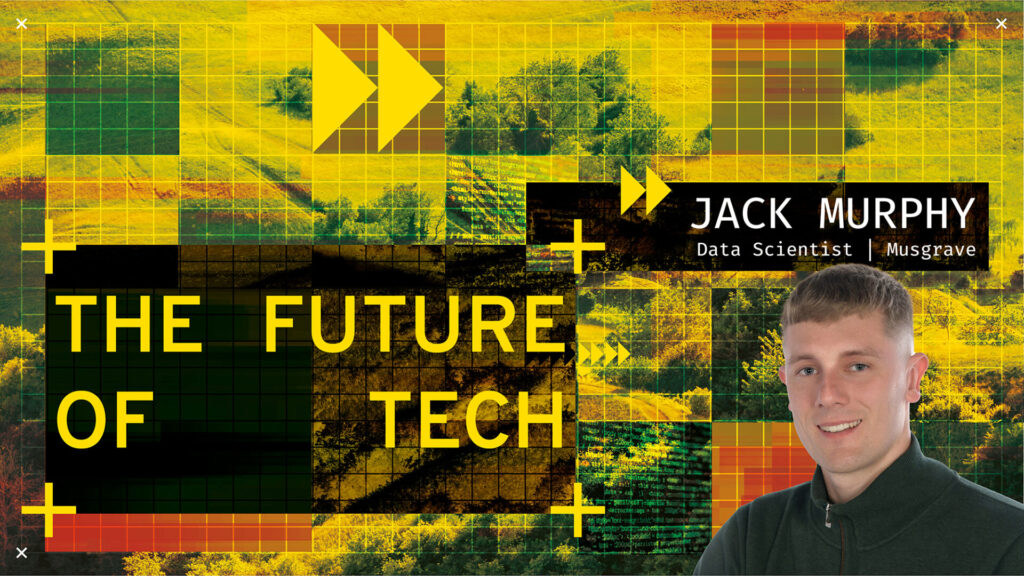Jack began his journey in tech through a degree in Business Information Systems (BIS) at UCC. Drawn to the blend of technical and interpersonal skills BIS offered, Jack quickly found his passion in coding, problem-solving, and collaborative projects. Over time, he became particularly interested in data for its holistic and strategic nature, which led him to pursue a Master’s degree in Data Science and Analytics. Now working at Musgrave, Jack is part of a growing data team where he thrives on shaping outcomes through hands-on work across engineering, analytics, and strategy. Jack won the prestigious Grad Ireland Graduate Employee of the Year 2025.
You mentioned that one of your goals at Musgrave was proving the value of the team. Can you describe a moment or project that truly demonstrated this impact?
One or two of the projects in the past year definitely had that effect. You know something’s shifting when people across the business start using language like “data culture.” That’s when you know it’s not just about delivering insight; it’s changing how people think about and solve problems.
The “wow” moments tend to come from relatively simple things rather than fancy deep learning models. Maybe it’s a solid regression or Bayesian inference model, something technically straightforward, but which delivers value very closely aligned with business objectives. For example, answering the question: “Can we increase sales by investing more in our promotional offers?” This means we can provide customers with better value, while also making a profit for Musgrave and our retailers. We can use regression analysis to predict which products have the most significant halo effect.
When people begin saying things like, “We can’t just go with our gut, what does the data say?”, that’s the real win. It’s not just one analyst doing their job better; it’s a mindset shift across teams when analysts and managers start to trust and utilise data in their own workflows. That momentum feeds upward to leadership.
If today’s success is about buy-in and trust, what does success look like in 5 to 10 years?
More self-sufficiency, definitely. Success is achieved when people can transition from a loosely defined problem to a clear, strategic decision, and they don’t need to involve data teams at every step.
At the same time, I think success means being closer to the revenue line. There’s a lot of “nice to have” AI out there, people building flashy LLM tools or throwing money at RAG models. But how many are actually generating ROI?

Is there any tech you wish existed?
A technology that integrates multiple data sources into one unified truth. Data cleaning remains a significant time-consuming task across every industry. We collect so much data, but it becomes a black box. Where did it come from? How was it processed? And how reliable is it?
It’s not even about new tech, just better integration. There is a huge potential for wider societal benefit if an open-source solution were to do the heavy lifting in integrating data, as it would democratise the capabilities of technology for everyone.

Take the GAA as an example, a largely volunteer-led organisation that sits at the heart of most communities. This type of data integration could help the GAA understand what communities need the most funding, which areas have the largest female teenage drop-off rates, which clubs promote inclusivity, and where better infrastructure is required in five years to support the game. There would be a huge social benefit to enabling the GAA to perform this kind of analysis.
Are you concerned about data privacy?
It is a concern to some extent, but I think we have already accepted a significant portion of that risk. For 15 years, people clicked “accept cookies” just to access a website. We have all been digitally tracked for quite a long time. ChatGPT is not much different in that sense; it’s just more visible now.
I am more concerned about corporate governance. For example, we have dedicated teams in AI regulation and data protection that ensure that all customer-facing data and systems are highly compliant. E.g. GDPR. There are protections, especially in the EU, and they are much stronger than in the U.S.
So yes, privacy matters, but it’s not new. The bigger issue for me is how companies manage and understand their own data. That’s where things could go wrong.

Similarly, in large companies, AI is likely being used in many areas without the teams managing risk in those areas being aware of it, such as using non-enterprise-protected LLMs or using facial recognition software. These are major risks that carry heavy penalties. Consensus seems to be that risk teams are all red tape and blockers – definitely in my experience from Musgrave they aren’t – they just want to ensure safe usage. However, the quick and easy “get things done” attitude often leads people to skip this step. Governance is certainly never at the forefront of anyone’s mind in general, and that is why it is such a risk – an AI system can very easily become discriminatory or biased, and that’s why governance is key.
Zooming out, what has technology given and taken from your generation?
It’s given us a lot. I can video call friends in Australia at any time. Remote work has made it easier to collaborate across different geographical locations. But it’s always on now. Go to a concert, everyone’s filming. No one is present. Phones are out; notifications are constant. It’s a double-edged sword. More good than bad, but it needs to be managed. You can control your screen time and choose to be present. That part is on us.

There is a fork in the road around my age once you leave college. Some realise that social media can be very unhealthy – disassociating with influencers and using it to share experiences, such as the current health and wellness trend of running, saunas, and coffee, among others. But there are also many people with really short attention spans who are hyper-online and rarely tune out. Social media is so addictive now. A lot depends on how my generation will act as parents – being focused on outdoors, time with friends, sports, etc and being careful with technology use will help.
Do you think it has reduced the ability of your generation to interact/communicate/make connections in person?
Technology, and more specifically social media, has undoubtedly reduced our generation’s ability to make in-person connections and shortened our attention spans. Often, people are happier to tune out by using AirPods and looking at screens. When I was in school, my classroom was a circus any time the teacher left the room. Earlier this year, I visited a TY group in school, and nobody was even speaking to each other when I arrived. It also drives a massive gap between young and old – people who are tuned into social media almost speak a different language at this stage and it’s not something people can keep up with. Saying stuff like “it’s giving (insert term)” or “GOAT” is not a conversation many can engage with
Is there an onus on social media companies to do something about this?
I think you need to sort yourself out first, to be honest. It’s not TikTok’s problem that people spend five hours a day on the platform.

Hence, the onus is on us to look after ourselves and those around us. Similarly, Flutter can try to prevent gambling addiction, but the onus isn’t solely on them to eradicate it.
What’s your one hope and one concern for technology in the next decade?
My hope is that we don’t waste it. We have the world at our fingertips. Anyone can learn anything, build anything.
My concern is that we will use it poorly, like using AI to auto-screen CVs. Someone could be a brilliant candidate but never get seen because of bad formatting – the opportunity for a better job or career has then been taken away from that person because of AI. That’s not what this tech should be for.

Someone who doesn’t have access to technology early is already behind to some degree. If one student can afford a ChatGPT Pro license, while another can barely afford a laptop because they are so expensive now, it is much easier for the first student to succeed.
Technology can also be very black and white. One mistake (insurance claim, missed rent) might permanently flag you as someone who shouldn’t get insurance or a mortgage. The human aspect of this will cease to exist, which is dangerous when not appropriately governed.
Widespread automation will surely come back to bite us financially at some stage through mass layoffs.
What is the Future of Tech?
The data culture shift is real and happening fast. During my internship a few years ago, the general attitude was: give the data team a problem, they disappear for ten weeks and come back with an answer. Now, the data team is in the room, collaborating, discussing, and being accountable.
These are multi-million-euro decisions. Data science isn’t just “nice to have” anymore. It’s becoming central to business strategy. And that means democratising access, letting everyone understand and be part of the process. There’s an art to that. Sometimes, you need to step away from the numbers to see the whole picture.
Check out all of the interviews in our Future of Tech series here>>> , listen on Spotify>>>> or watch the videos on our LinkedIn page>>>>


 Jump Back
Jump Back

